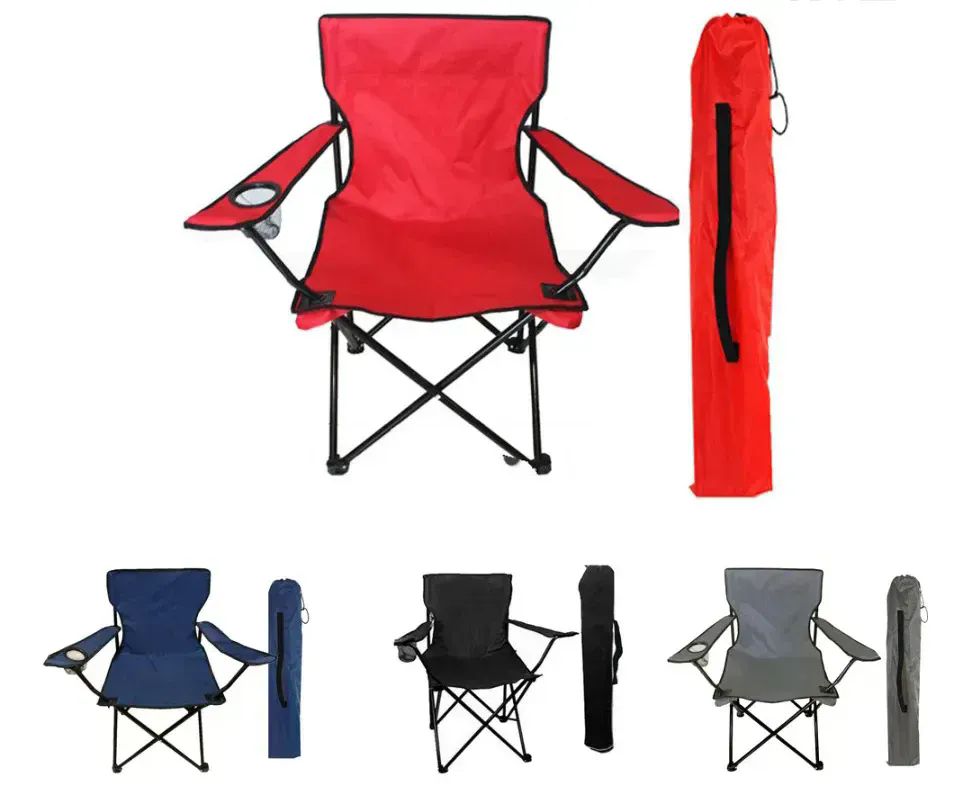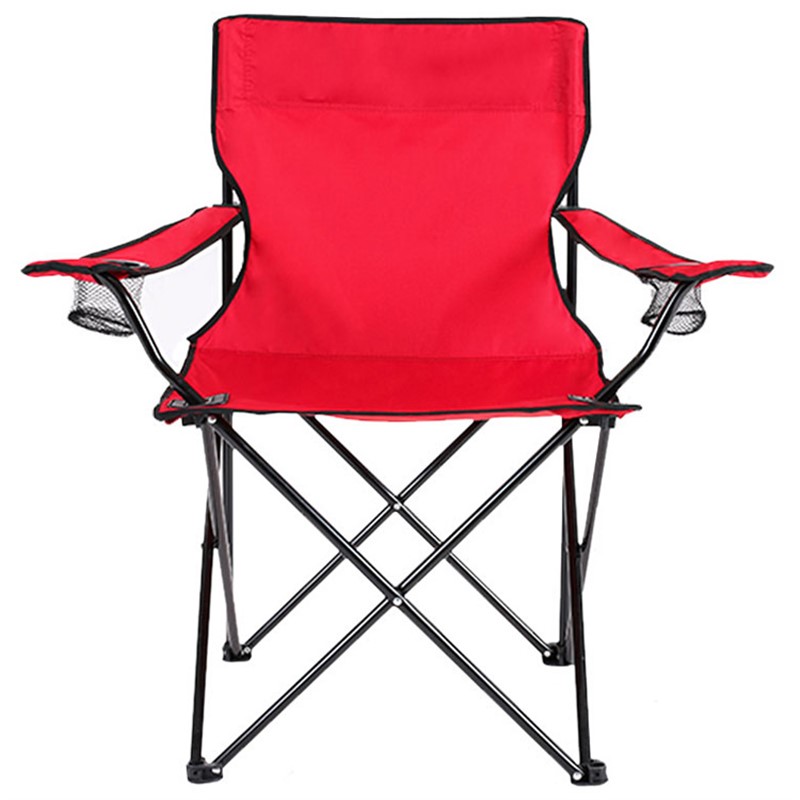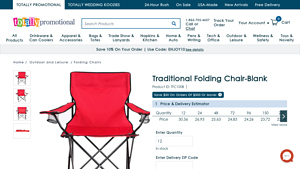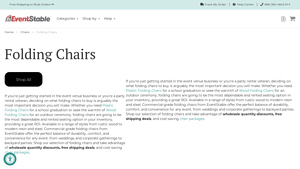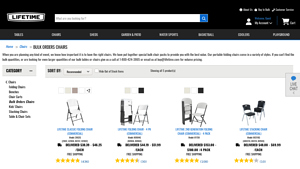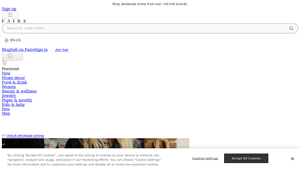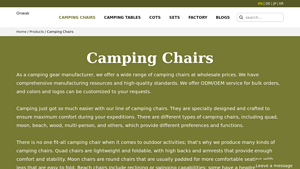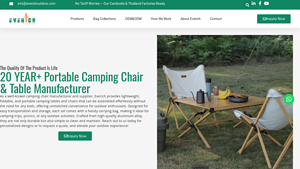Bulk Camping Chairs Explained: From A to Z for B2B Buyers
Introduction: Navigating the Global Market for bulk camping chairs
In today’s competitive landscape, sourcing bulk camping chairs that meet diverse quality and comfort standards can be a significant challenge for international B2B buyers. Whether you’re catering to a festival in South America, a corporate retreat in Germany, or an outdoor event in Saudi Arabia, the need for reliable, durable, and stylish seating options is paramount. This comprehensive guide aims to equip you with the essential insights needed to navigate the global market for bulk camping chairs, addressing critical factors such as types, applications, supplier vetting processes, and cost considerations.
As you explore the various options available, you’ll discover the benefits of different materials, from lightweight aluminum to robust steel frames, as well as the importance of ergonomics and portability. Moreover, we delve into the nuances of customizing chairs for branding purposes, enhancing your event’s visibility while ensuring comfort for your guests.
By leveraging the actionable insights within this guide, you can make informed purchasing decisions that align with your specific market needs, ultimately enhancing customer satisfaction and loyalty. Whether you are a seasoned buyer or new to the industry, this resource is tailored to empower you in your quest for the best bulk camping chairs, ensuring you can confidently meet your clients’ expectations across Africa, South America, the Middle East, and Europe.
Understanding bulk camping chairs Types and Variations
| Type Name | Key Distinguishing Features | Primary B2B Applications | Brief Pros & Cons for Buyers |
|---|---|---|---|
| Traditional Folding Chair | Lightweight, portable, padded back and seat, mesh pockets | Corporate events, outdoor gatherings | Pros: Easy to transport, cost-effective; Cons: Limited durability under heavy use. |
| Heavy-Duty Camping Chair | Reinforced frame, higher weight capacity, durable materials | Festivals, outdoor sports, camping trips | Pros: Strong and stable, suitable for rough conditions; Cons: Heavier and less portable. |
| Reclining Camping Chair | Adjustable backrest, ergonomic design, often includes footrest | Relaxation areas, camping, tailgating | Pros: Comfortable for extended use; Cons: Bulkier, may require more storage space. |
| Kids’ Camping Chair | Smaller size, fun colors and designs, lightweight | Family camping, outdoor events for children | Pros: Engaging for kids, portable; Cons: Limited weight capacity, may not suit adults. |
| Folding Armchair | Armrests for added comfort, often includes cup holders | Sporting events, picnics, outdoor festivals | Pros: Enhanced comfort; Cons: Can be pricier than basic models. |
What Are the Characteristics of Traditional Folding Chairs?
Traditional folding chairs are designed for ease of transport and setup. They feature a lightweight frame, often made from steel or aluminum, and a seat crafted from durable materials like 600D nylon. These chairs are ideal for corporate events and outdoor gatherings where quick assembly is essential. When purchasing, B2B buyers should consider the chair’s weight capacity, typically supporting up to 300 lbs, and the potential for customization with branding.
How Do Heavy-Duty Camping Chairs Stand Out?
Heavy-duty camping chairs are built with reinforced frames and can accommodate higher weight limits, making them suitable for rugged outdoor conditions. They are commonly used at festivals, sports events, and extended camping trips. Buyers should focus on the materials used, as high-quality fabrics and steel frames ensure durability. While they offer excellent stability, these chairs are heavier, impacting portability.
What Benefits Do Reclining Camping Chairs Offer?
Reclining camping chairs feature adjustable backrests and ergonomic designs, often including footrests for enhanced comfort during long periods of use. They are perfect for relaxation zones at campsites or tailgating events. B2B buyers should assess the chair’s weight and bulkiness, as they can be less portable than standard folding chairs. However, the comfort they provide can justify the trade-off in transportability.
Why Are Kids’ Camping Chairs Important for Family Events?
Kids’ camping chairs are smaller, lightweight, and come in vibrant colors and designs that appeal to children. These chairs are ideal for family camping trips and outdoor events aimed at younger audiences. When sourcing these products, B2B buyers should consider the weight capacity and safety features, ensuring they can support kids while remaining easy to carry. However, their limited capacity means they are not suitable for adults.
What Features Should Buyers Look for in Folding Armchairs?
Folding armchairs come with added comfort features such as armrests and cup holders, making them popular at sporting events and picnics. These chairs combine functionality with comfort, appealing to buyers looking for a more luxurious option. While they can be more expensive than basic folding chairs, their comfort and usability often justify the investment. Buyers should evaluate the chair’s durability and ease of transport when making a bulk purchase.
Key Industrial Applications of bulk camping chairs
| Industry/Sector | Specific Application of bulk camping chairs | Value/Benefit for the Business | Key Sourcing Considerations for this Application |
|---|---|---|---|
| Outdoor Events | Festivals and Concerts | Provides comfortable seating for large crowds, enhancing the attendee experience. | Durability, portability, weather resistance, bulk pricing. |
| Hospitality | Resorts and Campsites | Offers guests a relaxing outdoor seating option, enhancing their stay. | Aesthetic appeal, comfort features, branding options. |
| Sports and Recreation | Sporting Events | Ensures fans have comfortable seating during games, improving overall satisfaction. | Lightweight design, storage solutions, customization for branding. |
| Corporate Events | Company Picnics and Retreats | Facilitates informal gatherings, promoting team bonding and relaxation. | Customization for branding, ease of transport, and setup. |
| Emergency Services | Disaster Relief and Temporary Shelters | Provides essential seating for displaced individuals in emergency situations. | Sturdiness, ease of setup, and compliance with safety standards. |
How Are Bulk Camping Chairs Utilized in Outdoor Events?
In the outdoor events industry, bulk camping chairs are essential for festivals and concerts, where large crowds gather. These chairs provide comfortable seating options that enhance the attendee experience, allowing individuals to relax and enjoy the event. For international buyers, considerations such as weather resistance and durability are critical, especially in regions with varying climates. Additionally, competitive bulk pricing can help event organizers manage costs effectively while ensuring that attendees have a positive experience.
What Role Do Bulk Camping Chairs Play in Hospitality?
In the hospitality sector, particularly in resorts and campsites, bulk camping chairs serve as a key amenity for guests. They offer a comfortable outdoor seating option that enhances the overall guest experience, whether by a poolside, on a beach, or in a garden area. For B2B buyers in this industry, aesthetic appeal and comfort features are important, as they contribute to the brand image and customer satisfaction. Furthermore, options for customization can help businesses reinforce their branding while providing functional seating solutions.
How Are Bulk Camping Chairs Beneficial for Sporting Events?
Sporting events rely on bulk camping chairs to provide fans with comfortable seating during games. This enhances the overall satisfaction of attendees, encouraging them to return for future events. For international buyers, lightweight designs that are easy to transport and store are essential. Additionally, customization options for branding, such as team logos, can further engage fans and enhance the event atmosphere. Ensuring that these chairs meet durability standards is also a key consideration in this highly active environment.
Why Are Bulk Camping Chairs Important for Corporate Events?
In corporate settings, bulk camping chairs are often utilized during company picnics and retreats. They facilitate informal gatherings that promote team bonding and relaxation. For B2B buyers, customization for branding purposes can elevate the event’s professionalism and cohesiveness. Moreover, considerations such as ease of transport and setup are vital, as they contribute to the overall efficiency of event planning. Selecting chairs that are both functional and visually appealing is crucial for enhancing the corporate image.
How Do Bulk Camping Chairs Support Emergency Services?
In emergency services, bulk camping chairs play a crucial role in disaster relief efforts, providing essential seating for displaced individuals in temporary shelters. These chairs must be sturdy and easy to set up, as they are often deployed in urgent situations. Compliance with safety standards is also a key consideration for buyers in this sector. By sourcing durable and reliable seating solutions, organizations can ensure that they are adequately supporting those in need during crises, thereby fulfilling their humanitarian responsibilities.
3 Common User Pain Points for ‘bulk camping chairs’ & Their Solutions
Scenario 1: Sourcing Quality Chairs at Competitive Prices
The Problem: B2B buyers often face the challenge of finding reliable suppliers who can deliver bulk camping chairs that are not only affordable but also of high quality. This becomes particularly pressing when catering to outdoor events or corporate gatherings where comfort and durability are paramount. Poor-quality chairs can lead to customer dissatisfaction and damage a company’s reputation, especially if the chairs fail during use. Additionally, navigating multiple suppliers can complicate the purchasing process, leading to increased costs and logistical issues.
The Solution: To mitigate this issue, B2B buyers should conduct thorough research to identify suppliers who specialize in bulk camping chairs, particularly those with proven track records in their regions. Utilizing platforms that aggregate supplier information can save time and facilitate comparisons on price, quality, and service. It’s advisable to request samples before placing a large order to assess the material quality and comfort firsthand. Moreover, leveraging volume discounts can enhance cost-effectiveness; many suppliers offer tiered pricing, so negotiating based on projected order sizes is beneficial. Buyers should also consider establishing long-term relationships with a select few suppliers to streamline future orders and ensure consistent quality.
Scenario 2: Ensuring Chairs Meet Regional Compliance Standards
The Problem: Compliance with local regulations and standards can pose a significant challenge for international B2B buyers of bulk camping chairs. Each region may have different requirements regarding materials, safety, and environmental impact, which can complicate the purchasing process. Failing to comply with these regulations can result in costly fines, product recalls, or even bans on the use of non-compliant products at events.
The Solution: To address this pain point, buyers should familiarize themselves with the specific regulations governing camping and outdoor furniture in their target markets. This can be achieved by consulting local industry associations or regulatory bodies. When sourcing chairs, buyers must prioritize suppliers who are transparent about their compliance with these standards and who can provide necessary certifications. Additionally, creating a checklist of compliance requirements tailored to each region can streamline the sourcing process. This proactive approach not only ensures adherence to regulations but also builds trust with clients and customers, reinforcing the buyer’s commitment to quality and safety.
Scenario 3: Managing Logistics and Delivery Times for Bulk Orders
The Problem: Logistics can often become a headache for B2B buyers ordering bulk camping chairs, especially when tight timelines are involved for events or seasonal activities. Delays in delivery can disrupt planning and lead to last-minute scrambling for alternatives, which is both stressful and costly. Furthermore, international shipping can add layers of complexity, including customs clearance and unexpected tariffs, which can further delay the arrival of products.
The Solution: To effectively manage logistics, buyers should work closely with suppliers who have a strong logistics network and a reputation for timely deliveries. Establishing clear timelines and expectations upfront is crucial; buyers should communicate their deadlines and ask for guaranteed delivery dates. It’s also wise to use a reliable logistics partner familiar with international shipping regulations and processes to streamline customs clearance. Implementing an inventory management system can help track orders and anticipate delivery needs, allowing for better planning. Lastly, consider diversifying suppliers to include those with local warehousing options, which can significantly reduce delivery times and enhance flexibility in responding to last-minute demands.
Strategic Material Selection Guide for bulk camping chairs
What Are the Key Properties of Common Materials Used in Bulk Camping Chairs?
When selecting materials for bulk camping chairs, it’s essential to consider their key properties, as these directly influence product performance. The most common materials include aluminum, steel, plastic, and wood. Each material has unique characteristics that affect durability, weight, cost, and suitability for various applications.
How Does Aluminum Perform in Bulk Camping Chairs?
Aluminum is a popular choice for bulk camping chairs due to its lightweight nature and corrosion resistance. It typically has a temperature rating that allows it to withstand various environmental conditions without warping or degrading. Aluminum chairs are easy to transport, making them ideal for outdoor events.
Pros: The lightweight aspect of aluminum chairs makes them easy to handle and transport. They also exhibit excellent resistance to rust and corrosion, which is crucial for outdoor use.
Cons: While aluminum is durable, it can be less robust than steel, particularly under heavy loads. The cost of aluminum can also be higher than some other materials, which may affect bulk purchase budgets.
Impact on Application: Aluminum chairs are compatible with various outdoor environments, including humid or coastal areas, where corrosion could be a concern.
Considerations for International Buyers: Buyers from regions like the Middle East and Europe should ensure that the aluminum used complies with relevant standards such as ASTM or DIN, particularly regarding weight capacity and safety.
What Advantages Does Steel Offer for Camping Chairs?
Steel is another common material for bulk camping chairs, known for its strength and durability. It can support heavier weights than aluminum, making it suitable for more demanding applications.
Pros: Steel chairs are incredibly sturdy and can withstand significant wear and tear. They are often less expensive than aluminum, making them a cost-effective option for bulk orders.
Cons: The primary drawback is that steel is heavier and prone to rust if not properly coated. This can limit portability and longevity in outdoor settings.
Impact on Application: Steel chairs are ideal for fixed outdoor settings, such as campsites or outdoor events where transport is less of a concern.
Considerations for International Buyers: Buyers should look for steel chairs that meet corrosion-resistant standards, especially in humid climates, and ensure compliance with local safety regulations.
How Does Plastic Compare in Bulk Camping Chair Manufacturing?
Plastic is often used in bulk camping chairs for its versatility and cost-effectiveness. It is lightweight and can be molded into various shapes and designs.
Pros: Plastic chairs are generally the most affordable option and can be produced in various colors and styles. They are also resistant to moisture and easy to clean.
Cons: The main limitation of plastic is its lower durability compared to metal options. It can become brittle over time, especially in extreme temperatures.
Impact on Application: Plastic chairs are suitable for casual outdoor settings, such as picnics or festivals, where ease of use and affordability are prioritized.
Considerations for International Buyers: Ensure that the plastic used is UV-resistant and complies with safety standards to avoid issues in regions with intense sunlight, such as Africa and the Middle East.
What Role Does Wood Play in Bulk Camping Chair Design?
Wood, particularly treated hardwoods, is used in some camping chair designs for its aesthetic appeal and natural feel.
Pros: Wooden chairs offer a classic look and can provide excellent durability when properly treated. They can also be more comfortable for prolonged use.
Cons: Wood is generally heavier and more expensive than metal or plastic options. It also requires more maintenance to prevent decay or damage from moisture.
Impact on Application: Wooden chairs are often used in glamping or upscale outdoor events where aesthetics are a priority.
Considerations for International Buyers: Buyers should ensure that the wood is sourced sustainably and treated to withstand local climate conditions, particularly in humid regions.
Summary Table of Material Selection for Bulk Camping Chairs
| Material | Typical Use Case for bulk camping chairs | Key Advantage | Key Disadvantage/Limitation | Relative Cost (Low/Med/High) |
|---|---|---|---|---|
| Aluminum | Lightweight outdoor events | Corrosion-resistant and portable | Less robust than steel | Medium |
| Steel | Fixed outdoor settings | Highly durable and cost-effective | Heavier and prone to rust | Low |
| Plastic | Casual outdoor settings | Affordable and easy to clean | Less durable and can become brittle | Low |
| Wood | Upscale outdoor events | Aesthetic appeal and comfort | Heavier and requires maintenance | High |
This strategic material selection guide provides valuable insights for B2B buyers looking to procure bulk camping chairs, ensuring that they choose the right materials for their specific needs and regional considerations.
In-depth Look: Manufacturing Processes and Quality Assurance for bulk camping chairs
What Are the Key Stages in the Manufacturing Process of Bulk Camping Chairs?
The manufacturing process for bulk camping chairs involves several critical stages, each requiring specific techniques and attention to detail. Understanding these stages can help B2B buyers make informed decisions about their suppliers.
Material Preparation: What Materials Are Used?
The first step in manufacturing bulk camping chairs is material preparation. Manufacturers typically use durable materials such as high-quality steel for the frame and heavy-duty nylon or polyester for the seat and backrest. The selection of materials is crucial, as they determine the chair’s weight capacity, durability, and resistance to outdoor elements.
During this stage, raw materials undergo inspection to ensure they meet predefined specifications. Suppliers often source materials from trusted vendors to guarantee quality, and it is advisable for B2B buyers to inquire about the origin and certification of these materials.
How Are Camping Chairs Formed and Assembled?
Once the materials are prepared, the next stage is forming and assembly. This involves cutting the fabric to size, bending and welding the metal parts, and sewing the seat components together. Advanced techniques such as computer numerical control (CNC) machining may be used to ensure precision in cutting and shaping the frames.
The assembly process typically includes:
- Frame Assembly: The steel or aluminum parts are welded or bolted together to create the chair’s structure.
- Fabric Attachment: The seat and backrest are securely attached to the frame using high-strength stitching or rivets.
- Quality Checks: At this stage, manufacturers conduct preliminary quality checks to identify defects in workmanship or materials.
B2B buyers should assess whether suppliers have standardized procedures in place for these processes to ensure consistency in product quality.
What Finishing Techniques Are Commonly Used?
Finishing is the final stage of manufacturing and is essential for both aesthetics and durability. Common finishing techniques include:
- Powder Coating: This process adds a protective layer to metal frames, enhancing corrosion resistance and providing a variety of color options.
- Water-Resistant Treatment: Fabrics may undergo treatments that make them water-resistant, ensuring longevity in outdoor conditions.
- Quality Inspection: After finishing, each chair is inspected for visual defects and functionality.
B2B buyers should inquire about the specific finishing techniques used by manufacturers, as these can significantly impact the longevity and performance of the chairs.
What Quality Assurance Standards Should B2B Buyers Consider?
Quality assurance is critical in ensuring that bulk camping chairs meet international safety and performance standards. For B2B buyers, understanding these standards can facilitate better supplier selection.
Which International Standards Are Relevant?
Manufacturers of bulk camping chairs should adhere to relevant international standards such as:
- ISO 9001: This standard focuses on quality management systems and ensures that manufacturers consistently provide products that meet customer and regulatory requirements.
- EN 581: This European standard specifies safety requirements for outdoor furniture, including camping chairs.
- ANSI/BIFMA: In the United States, this standard covers the safety and performance of furniture products.
For buyers in Europe, certifications such as the CE mark indicate compliance with health, safety, and environmental protection standards.
What Are the Key Quality Control Checkpoints?
Quality control (QC) is an integral part of the manufacturing process and typically includes several checkpoints:
- Incoming Quality Control (IQC): This involves inspecting materials upon arrival to ensure they meet specifications.
- In-Process Quality Control (IPQC): During the manufacturing process, random samples are taken to verify that production adheres to quality standards.
- Final Quality Control (FQC): This final inspection assesses the finished products for defects and functionality before shipping.
B2B buyers should request information on the QC procedures employed by suppliers, including the frequency and methods of inspections conducted.
How Can B2B Buyers Verify Supplier Quality Control?
Verifying the quality control processes of suppliers is essential for B2B buyers, particularly when sourcing from international markets. Here are several methods to ensure that suppliers maintain high-quality standards.
What Are the Best Practices for Supplier Audits?
Conducting supplier audits is one of the most effective ways to assess a manufacturer’s quality assurance practices. During an audit, buyers can evaluate:
- Production Capabilities: Assess the manufacturing processes and equipment used.
- Quality Control Systems: Review documentation related to quality checks and compliance with international standards.
- Employee Training: Ensure that staff are adequately trained in quality management and manufacturing processes.
Buyers should consider engaging third-party auditors to provide an unbiased assessment of the supplier’s capabilities.
How Can B2B Buyers Access Quality Reports and Testing Results?
Suppliers should be willing to provide quality reports and testing results to potential buyers. Key documents to request include:
- Certificates of Compliance: These confirm that products meet specified standards.
- Test Reports: Documentation of any testing conducted, such as load tests or durability assessments.
- Quality Assurance Policies: A comprehensive overview of the manufacturer’s quality assurance processes and standards.
Having access to these documents can help B2B buyers make informed decisions and mitigate risks associated with product quality.
What Are the Nuances of Quality Control for International Buyers?
For international B2B buyers, particularly those from diverse regions like Africa, South America, the Middle East, and Europe, understanding the nuances of quality control is crucial.
How Do Regional Standards Affect Quality Assurance?
Different regions may have specific quality and safety standards that manufacturers must comply with. B2B buyers should familiarize themselves with local regulations and market expectations to ensure that products meet regional requirements. For instance, buyers in Germany may expect compliance with strict EU regulations, while those in Saudi Arabia may have different standards.
What Should Buyers Know About Logistics and Quality During Shipping?
Quality assurance does not end at the factory. International shipping can introduce risks to product quality. B2B buyers should consider:
- Packaging Standards: Ensure that products are packaged adequately to prevent damage during transport.
- Handling Procedures: Verify that suppliers have protocols in place for handling and shipping products to minimize risks.
By understanding the entire supply chain, B2B buyers can ensure that the quality of bulk camping chairs is maintained from the factory to the end-user.
In conclusion, a thorough understanding of the manufacturing processes and quality assurance practices for bulk camping chairs can empower B2B buyers to make informed purchasing decisions. By focusing on material selection, manufacturing techniques, and quality control standards, buyers can ensure they partner with reliable suppliers who meet their specific needs.
Practical Sourcing Guide: A Step-by-Step Checklist for ‘bulk camping chairs’
When sourcing bulk camping chairs, it’s essential to follow a systematic approach to ensure you meet your organization’s needs while maximizing value. This checklist will guide you through the critical steps to procure high-quality chairs that align with your requirements and budget.
Step 1: Define Your Requirements
Begin by clearly outlining what you need from the camping chairs. Consider factors such as the intended use (e.g., outdoor events, camping, festivals), the number of chairs required, and the expected lifespan of the product.
– Specifications: Think about the weight capacity, materials (e.g., aluminum, steel, fabric), and design features (e.g., cup holders, storage pockets).
– Quantity: Determine how many chairs you need, as bulk orders can often lead to significant discounts.
Step 2: Research Potential Suppliers
Identify and compile a list of suppliers who specialize in bulk camping chairs. This step is crucial to ensure you have multiple options to evaluate.
– Supplier Reputation: Look for suppliers with a solid track record in the camping or outdoor equipment industry. Read reviews and testimonials from other businesses.
– Product Range: Ensure the suppliers offer a variety of styles and price points to suit your specific needs.
Step 3: Evaluate Supplier Certifications
Before making a commitment, verify that potential suppliers meet relevant industry certifications and standards. This is vital for ensuring product quality and safety.
– Quality Assurance: Check if they have ISO certifications or other relevant quality control standards.
– Material Safety: Ensure that the materials used in the chairs comply with safety regulations, particularly if they will be used in public or commercial settings.
Step 4: Request Samples
Always request samples before placing a large order. This allows you to assess the quality, comfort, and durability of the chairs firsthand.
– Testing: Use the samples in real-world scenarios to evaluate how they perform under various conditions.
– Feedback: Gather feedback from your team or customers who will use the chairs, as their input is invaluable for the final decision.
Step 5: Negotiate Pricing and Terms
Engage in discussions with suppliers to negotiate the best possible pricing and terms. Bulk orders typically provide leverage for better deals.
– Volume Discounts: Ask about discounts for larger orders and any potential for future purchases.
– Payment Terms: Clarify payment options and delivery timelines to ensure they align with your budget and project deadlines.
Step 6: Review Logistics and Shipping Options
Consider the logistics involved in getting the chairs from the supplier to your location. Efficient shipping can significantly impact your overall costs and timeline.
– Shipping Costs: Inquire about shipping fees, as these can vary widely among suppliers.
– Delivery Timeframes: Confirm the estimated delivery times to ensure they meet your event schedule or usage plans.
Step 7: Finalize Your Order and Confirm Details
Once you have selected a supplier, finalize the order by confirming all details in writing. This step is crucial to avoid misunderstandings later.
– Order Confirmation: Ensure all specifications, quantities, prices, and delivery dates are documented.
– Follow-Up: Maintain communication with the supplier throughout the production and shipping process to address any issues that may arise.
By following this checklist, B2B buyers can confidently source bulk camping chairs that meet their organization’s needs while ensuring quality and value.
Comprehensive Cost and Pricing Analysis for bulk camping chairs Sourcing
What Are the Key Cost Components in Sourcing Bulk Camping Chairs?
When sourcing bulk camping chairs, understanding the cost structure is crucial for B2B buyers. The primary cost components include:
-
Materials: The choice of materials significantly impacts the pricing. Common materials for camping chairs include aluminum frames, durable nylon or polyester fabrics, and high-density foam for padding. Higher-quality materials often lead to increased costs but can enhance durability and user satisfaction.
-
Labor: Labor costs vary based on the manufacturing location. Regions with lower labor costs can offer competitive pricing, but this may come at the expense of quality control. It’s vital to balance cost and craftsmanship to ensure that the final product meets expectations.
-
Manufacturing Overhead: This includes expenses related to factory operations, utilities, and administrative costs. Understanding the overhead associated with different suppliers can provide insights into their pricing structure.
-
Tooling: Custom designs may require specialized tooling, which can add to initial costs. If you plan to order a customized chair, inquire about these costs upfront.
-
Quality Control (QC): Implementing stringent QC measures is essential to ensure product consistency and safety. Suppliers may include QC costs in their pricing, so it’s wise to clarify this aspect during negotiations.
-
Logistics: Transportation costs can vary significantly based on shipping methods and distances. International buyers should account for tariffs, taxes, and potential delays when importing goods.
-
Margin: Suppliers typically include a profit margin in their pricing. Understanding typical margins within the industry can help buyers assess whether a quote is competitive.
How Do Price Influencers Affect Bulk Camping Chair Costs?
Several factors influence the pricing of bulk camping chairs, including:
-
Volume/MOQ: Larger orders often come with discounts. Suppliers may offer tiered pricing based on minimum order quantities (MOQ), so negotiating your order size could lead to substantial savings.
-
Specifications/Customization: Custom features, such as unique colors or branding, can increase costs. Clearly define your requirements to avoid unexpected price increases.
-
Material Quality and Certifications: Chairs made from premium materials or those that meet certain safety certifications may command higher prices. Always verify if the materials meet your regional compliance standards, especially when sourcing from abroad.
-
Supplier Factors: The reliability and reputation of the supplier can impact pricing. Established suppliers may charge more due to their track record and assurances of quality.
-
Incoterms: Understanding the shipping terms (Incoterms) is crucial. Different terms can affect total costs, as they define who is responsible for shipping, insurance, and tariffs.
What Tips Can Help Buyers Negotiate Better Prices for Bulk Camping Chairs?
To ensure cost-efficiency when sourcing bulk camping chairs, consider the following strategies:
-
Negotiate Effectively: Don’t hesitate to negotiate prices, especially for larger orders. Suppliers often have flexibility in pricing, particularly if they see potential for future business.
-
Focus on Total Cost of Ownership (TCO): Beyond initial pricing, consider the TCO, which includes maintenance, replacement costs, and the longevity of the chairs. Investing in higher-quality chairs may lead to lower TCO in the long run.
-
Be Aware of Pricing Nuances for International Buyers: Different regions may have unique pricing structures due to local demand, shipping costs, and tariffs. Research market conditions in your target region to avoid overpaying.
-
Request Samples: Before placing a bulk order, request samples to assess quality firsthand. This can prevent costly mistakes and ensure that the product meets your expectations.
Conclusion
By understanding the cost components and pricing influencers in the bulk camping chairs market, international B2B buyers can make informed decisions. With careful negotiation and a focus on total cost, you can secure the best value for your investment. Always remember that indicative prices may vary based on market conditions, so continuous research and supplier engagement are key to achieving optimal outcomes.
Alternatives Analysis: Comparing bulk camping chairs With Other Solutions
When considering the procurement of seating solutions for outdoor events or activities, bulk camping chairs represent a popular choice. However, there are alternative solutions that may better suit specific needs, depending on various factors such as performance, cost, and usability. This analysis aims to compare bulk camping chairs with other viable alternatives to help international B2B buyers make informed decisions.
| Comparison Aspect | Bulk Camping Chairs | Traditional Folding Chairs | Portable Benches |
|---|---|---|---|
| Performance | Lightweight and portable; designed for outdoor use | Good for various settings; sturdy but may lack outdoor-specific features | Space-efficient; can accommodate multiple users; less portable |
| Cost | Moderate pricing, often with bulk discounts | Varies widely; typically affordable | Generally lower cost per unit for larger groups |
| Ease of Implementation | Easy to set up and transport; requires minimal storage space | Straightforward setup; slightly bulkier | Requires more space; may need assembly |
| Maintenance | Generally low-maintenance; weather-resistant materials | Moderate maintenance; fabric may need cleaning | Low maintenance; durable materials can withstand elements |
| Best Use Case | Ideal for camping, festivals, and outdoor events | Suitable for corporate events, backyard gatherings | Great for picnics, community events, and sports activities |
What Are the Advantages and Disadvantages of Traditional Folding Chairs?
Traditional folding chairs serve as a versatile alternative to bulk camping chairs. They are often built with sturdier materials, making them suitable for both indoor and outdoor use. The main advantage lies in their stability and comfort, as many models feature padded seating. However, they can be bulkier and less portable than camping chairs, making transportation to remote locations more challenging. Additionally, while they can often be found at competitive prices, costs can vary significantly based on the materials and design.
How Do Portable Benches Compare to Bulk Camping Chairs?
Portable benches offer a unique solution for group seating needs. They are space-efficient, allowing multiple individuals to sit together, which can be beneficial for events like community gatherings or sports activities. The cost per seating capacity can be lower compared to bulk camping chairs, especially when purchasing for large groups. However, benches may lack the individual comfort and portability that camping chairs provide. They typically require more space for setup and may not be as easily transported, making them less ideal for situations where mobility is essential.
Conclusion: How Can B2B Buyers Choose the Right Seating Solution?
Selecting the right seating solution depends on the specific needs and circumstances of the event or usage scenario. Bulk camping chairs are excellent for outdoor environments where portability and lightweight design are paramount. In contrast, traditional folding chairs may be preferred for more formal settings or where durability is essential. Portable benches can effectively serve larger groups but may compromise on individual comfort. B2B buyers should assess their priorities, such as budget, space, and the type of events they are hosting, to determine which option will provide the best value for their unique requirements.
Essential Technical Properties and Trade Terminology for bulk camping chairs
What Are the Key Technical Properties of Bulk Camping Chairs?
When sourcing bulk camping chairs, understanding their technical specifications is crucial for ensuring product quality, durability, and suitability for your target market. Here are some essential properties to consider:
-
Material Composition
Most bulk camping chairs are constructed from materials such as steel, aluminum, or high-density polyethylene (HDPE). Steel frames offer durability and strength, making them ideal for heavy-duty use, while aluminum is lightweight and rust-resistant. The seat fabric is often made from 600D nylon or polyester, known for its tear resistance and weatherproof qualities. Selecting the right material impacts the chair’s longevity and user experience, especially in outdoor environments. -
Weight Capacity
The weight capacity of a camping chair is a critical specification that ensures safety and functionality. Most bulk camping chairs support between 250 to 400 pounds. This rating is essential for B2B buyers to consider, as it influences the target demographic and market positioning. Offering chairs with varying weight capacities can cater to a broader customer base. -
Portability and Foldability
A significant advantage of camping chairs is their portability. Look for models that are lightweight and easily foldable, allowing for convenient transportation and storage. Features such as carrying bags or straps enhance portability. This specification is vital for buyers targeting outdoor enthusiasts who prioritize ease of use. -
Durability and Weather Resistance
Chairs designed for outdoor use should be durable and resistant to various weather conditions. Look for UV-resistant materials to prevent fading and mold-resistant fabrics to ensure longevity. Understanding the durability specifications helps B2B buyers select products that can withstand harsh outdoor environments, appealing to both retail and rental markets. -
Comfort Features
Comfort features such as padded seats, backrests, and armrests can significantly influence customer satisfaction. Some models may also include cup holders and side pockets for added convenience. B2B buyers should assess these features based on the target market’s expectations, as comfort can be a key selling point.
What Are Common Trade Terminologies Used in Bulk Camping Chair Transactions?
Understanding industry jargon can facilitate better communication and negotiations in B2B transactions. Here are several essential terms:
-
OEM (Original Equipment Manufacturer)
An OEM is a company that produces parts or equipment that may be marketed by another manufacturer. In the context of camping chairs, an OEM might produce chairs that are branded and sold by a retailer. This term is vital for buyers looking to partner with manufacturers for private-label products. -
MOQ (Minimum Order Quantity)
MOQ refers to the smallest quantity of a product that a supplier is willing to sell. This term is crucial for bulk buyers, as it affects inventory planning and cost. Understanding the MOQ helps businesses gauge potential costs and ensure they meet supplier requirements. -
RFQ (Request for Quotation)
An RFQ is a document sent to suppliers requesting pricing for specific products. For bulk camping chairs, an RFQ can include details about desired specifications, quantities, and delivery timelines. This term is important for buyers looking to compare prices and negotiate terms effectively. -
Incoterms (International Commercial Terms)
Incoterms are a set of predefined commercial terms published by the International Chamber of Commerce that define the responsibilities of buyers and sellers in international transactions. Understanding Incoterms is crucial for B2B buyers involved in cross-border trade, as they clarify shipping responsibilities, risk management, and cost allocation. -
Lead Time
Lead time is the time taken from placing an order to the delivery of the product. In bulk chair orders, this can vary based on manufacturing capacity and shipping logistics. Knowing the lead time is essential for effective supply chain management and meeting customer demands.
By familiarizing yourself with these technical properties and industry terms, you can make informed purchasing decisions that align with your business objectives and customer expectations.
Navigating Market Dynamics and Sourcing Trends in the bulk camping chairs Sector
What Are the Current Market Dynamics and Key Trends in the Bulk Camping Chairs Sector?
The bulk camping chairs sector is experiencing notable growth driven by several global factors. The increasing popularity of outdoor recreational activities, particularly in regions such as Africa, South America, the Middle East, and Europe, is a primary driver. As outdoor events, festivals, and gatherings become more prevalent, the demand for portable, durable, and cost-effective seating solutions is surging. B2B buyers are seeking suppliers that can offer high-quality chairs at competitive prices, with many manufacturers expanding their product ranges to include customizable options that cater to diverse market needs.
Emerging technologies, such as e-commerce platforms and digital supply chain management tools, are revolutionizing the procurement process for bulk camping chairs. International B2B buyers can now easily compare prices, manage orders, and track shipments through online platforms, streamlining the purchasing experience. Additionally, advancements in materials and manufacturing processes are leading to lighter, more durable, and sustainable chair options, appealing to environmentally conscious buyers.
Key market dynamics include fluctuating raw material prices, which can impact production costs and pricing strategies. Furthermore, geopolitical factors and trade policies can influence sourcing decisions, especially for buyers in regions with stringent import regulations. Understanding these dynamics is essential for B2B buyers to navigate the complexities of the market effectively.
How Is Sustainability and Ethical Sourcing Influencing the Bulk Camping Chairs Market?
Sustainability and ethical sourcing are becoming increasingly vital in the bulk camping chairs sector. As environmental awareness grows among consumers and businesses, buyers are prioritizing products that minimize ecological impact. This includes selecting chairs made from recycled materials or sustainably sourced wood, which not only appeal to eco-conscious customers but also enhance brand reputation.
Furthermore, ethical supply chains are critical in ensuring fair labor practices and reducing the carbon footprint associated with manufacturing processes. B2B buyers should look for suppliers that hold certifications such as Forest Stewardship Council (FSC) or Global Organic Textile Standard (GOTS), which demonstrate a commitment to sustainability. These certifications not only provide assurance of ethical practices but can also meet the demands of increasingly conscious consumers who are willing to pay a premium for sustainable products.
Incorporating these sustainability principles into procurement strategies not only aligns with global trends but also offers competitive advantages. Businesses that adopt green practices can differentiate themselves in a crowded marketplace, attracting a loyal customer base while contributing positively to the environment.
What Is the Brief Evolution of Bulk Camping Chairs?
The evolution of bulk camping chairs can be traced back to the early 20th century when outdoor activities began gaining popularity. Initially, camping chairs were bulky and made from heavy materials, limiting their portability. However, the introduction of lightweight materials, such as aluminum and durable fabrics, revolutionized the design and functionality of camping chairs.
By the late 20th century, manufacturers began offering folding and collapsible designs, making them more accessible for outdoor enthusiasts. The rise of e-commerce in the 21st century further transformed the market, enabling suppliers to reach international B2B buyers directly. Today, the focus has shifted towards customization, sustainability, and ergonomic designs, reflecting the changing preferences of consumers and businesses alike. This evolution highlights the importance of adapting to market demands, making it crucial for B2B buyers to stay informed about trends and innovations in the sector.
Frequently Asked Questions (FAQs) for B2B Buyers of bulk camping chairs
-
How do I ensure the quality of bulk camping chairs before purchase?
To guarantee the quality of bulk camping chairs, conduct thorough research on potential suppliers. Request samples to assess the material, durability, and craftsmanship firsthand. Verify supplier certifications and read customer reviews to gauge reliability. Additionally, consider implementing quality assurance protocols during production, such as third-party inspections, to ensure the chairs meet your standards before shipment. -
What are the best materials for durable camping chairs?
When sourcing camping chairs, look for materials like aluminum for frames due to its lightweight and rust-resistant properties. High-density polyethylene (HDPE) and polyester are excellent choices for seating, offering durability and weather resistance. Chairs with reinforced stitching and UV-resistant fabrics will enhance longevity, making them ideal for outdoor use across various climates. -
What is the minimum order quantity (MOQ) for bulk camping chairs?
MOQs can vary significantly among suppliers, typically ranging from 50 to several hundred units. To secure the best pricing, inquire about bulk discounts and negotiate terms based on your projected sales volume. If you anticipate future orders, establishing a relationship with a supplier may lead to lower MOQs in subsequent transactions. -
How can I customize bulk camping chairs for my brand?
Customization options often include color selection, logo printing, and specific design features. Discuss your requirements with the supplier to understand available customization services and associated costs. Some manufacturers offer digital proofs to visualize the final product, which can help you make adjustments before production begins, ensuring the chairs align with your branding. -
What payment terms should I expect when ordering bulk camping chairs?
Payment terms can vary by supplier, but standard practices include upfront deposits (typically 30% to 50%) with the balance due before shipment. Some suppliers may offer net payment terms, allowing you to pay within 30 to 60 days post-delivery. Always clarify terms in the contract to avoid misunderstandings and ensure a smooth transaction. -
What logistics considerations should I keep in mind for international shipping of camping chairs?
When arranging international shipping, consider the cost, transit time, and customs regulations of your destination country. Collaborate with your supplier to choose a reliable freight forwarder and ensure all shipping documentation is in order. Factor in duties and taxes, and explore options for express shipping if you have tight deadlines for events or promotions. -
How do I vet suppliers for bulk camping chairs?
To vet suppliers effectively, research their business history, customer feedback, and industry reputation. Request references from other B2B buyers and verify their production capabilities. Conduct site visits if possible, or utilize virtual tours to assess manufacturing processes. Ensure they comply with international quality standards, which is crucial for maintaining your brand’s reputation. -
What are the common challenges faced when sourcing camping chairs internationally?
Challenges may include language barriers, cultural differences, and varying regulations in different countries. Additionally, managing logistics and ensuring timely delivery can be complex. To mitigate these issues, establish clear communication channels, employ a reliable logistics partner, and stay informed about trade regulations in both your country and the supplier’s country. Building strong relationships with suppliers can also ease potential challenges.
Important Disclaimer & Terms of Use
⚠️ Important Disclaimer
The information provided in this guide, including content regarding manufacturers, technical specifications, and market analysis, is for informational and educational purposes only. It does not constitute professional procurement advice, financial advice, or legal advice.
While we have made every effort to ensure the accuracy and timeliness of the information, we are not responsible for any errors, omissions, or outdated information. Market conditions, company details, and technical standards are subject to change.
B2B buyers must conduct their own independent and thorough due diligence before making any purchasing decisions. This includes contacting suppliers directly, verifying certifications, requesting samples, and seeking professional consultation. The risk of relying on any information in this guide is borne solely by the reader.
Top 6 Bulk Camping Chairs Manufacturers & Suppliers List
1. Totally Promotional – Traditional Folding Chairs
Domain: totallypromotional.com
Registered: 2008 (17 years)
Introduction: This company, Totally Promotional – Traditional Folding Chairs, is a notable entity in the market. For specific product details, it is recommended to visit their website directly.
2. EventStable – Wholesale Folding Chairs
Domain: eventstable.com
Registered: 2011 (14 years)
Introduction: Wholesale Folding Chairs for Sale | EventStable.com offers a variety of folding chairs including Plastic, Resin, Wood, Metal, and Bamboo options. They provide chair packages, replacement parts, and dollies for transportation. The chairs are commercial-grade, designed for durability, comfort, and convenience for events like weddings, corporate gatherings, and backyard parties. Customers can benefit…
3. Lifetime – Bulk Folding Chairs
Domain: lifetime.com
Registered: 1993 (32 years)
Introduction: Bulk Orders Chairs from Lifetime Products, Inc. offer a variety of portable folding chairs in special bulk chair packs for events. Customers can inquire about larger quantities and volume pricing by calling 1-800-424-3865 or emailing [email protected]. The price range for chairs is from $0.00 to $10,000.00.
4. Faire – Wholesale Camp Chair
Domain: faire.com
Registered: 1998 (27 years)
Introduction: Wholesale camp chair for your store. Shop wholesale online from over 100,000 brands.
5. Onwak – Wholesale Camping Chairs & Tables
Domain: onwak.com
Registered: 2022 (3 years)
Introduction: Camping Chairs Wholesale in Various Sizes: Quad Camping Chairs, Camping Moon Chairs, Folding Beach Chairs, Wooden Camping Chairs, Two Person Camping Chair, Plastic Chair, Other Chairs, Camping Tables (Aluminum, Wooden, Plastic), Cots Sets. Features: ODM/OEM service for bulk orders, customizable colors and logos, lightweight and sturdy materials, various types for different preferences and function…
6. Everich Outdoor – Lightweight Camping Furniture
Domain: everichoutdoor.com
Registered: 2019 (6 years)
Introduction: Everich Outdoor is a wholesale camping chair and table manufacturer offering lightweight, foldable, and portable camping furniture. Key features include:
– Easy assembly without tools
– Convenient carrying bag for transportation and storage
– Made from high-quality aluminum alloy for durability
– Easy to clean and maintain
– Various product options including foldable table sets with chairs, p…
Strategic Sourcing Conclusion and Outlook for bulk camping chairs
In conclusion, the strategic sourcing of bulk camping chairs presents a unique opportunity for international B2B buyers to capitalize on the growing demand for outdoor leisure products. As we have discussed, choosing the right suppliers can lead to substantial cost savings, improved product quality, and enhanced brand visibility. With various options available, from traditional folding chairs to modern designs, buyers should prioritize suppliers that offer customization and competitive pricing, particularly those with established logistics capabilities to streamline the procurement process.
The key takeaway is to approach sourcing with a clear understanding of market trends and buyer preferences. Whether catering to corporate events, outdoor festivals, or retail needs, aligning product offerings with consumer expectations will drive sales and customer satisfaction.
Looking forward, the demand for bulk camping chairs is expected to increase as outdoor activities gain popularity across diverse regions, including Africa, South America, the Middle East, and Europe. Now is the time to establish strategic partnerships with reliable suppliers to secure the best deals and ensure timely delivery. Engage with potential manufacturers and distributors today to position your business advantageously in this thriving market.
